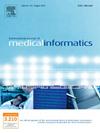Artificial intelligence in clinical trials: A comprehensive review of opportunities, challenges, and future directions
IF 4.1
2区 医学
Q2 COMPUTER SCIENCE, INFORMATION SYSTEMS
International Journal of Medical Informatics
Pub Date : 2025-10-08
DOI:10.1016/j.ijmedinf.2025.106141
引用次数: 0
Abstract
Background
Clinical trials face unprecedented challenges including recruitment delays affecting 80% of studies, escalating costs exceeding $200 billion annually in pharmaceutical R&D, success rates below 12%, and data quality issues affecting 50% of datasets. Artificial intelligence (AI) offers transformative solutions to address these systemic inefficiencies across the clinical trial lifecycle.
Objective
To evaluate the current state, future potential, and implementation challenges of AI technologies in clinical trials, providing evidence-based guidance for responsible AI integration while maintaining patient safety and scientific integrity.
Method
Comprehensive narrative review following established guidelines for literature synthesis. Systematic search of PubMed, Embase, IEEE Xplore, and Google Scholar databases from January 2015 to December 2024. Data extraction and narrative synthesis organized thematically according to clinical trial lifecycle stages.
Results
Analysis of relevant studies demonstrated substantial AI benefits: patient recruitment tools improved enrollment rates by 65%, predictive analytics models achieved 85% accuracy in forecasting trial outcomes, and AI integration accelerated trial timelines by 30–50% while reducing costs by up to 40%. Digital biomarkers enabled continuous monitoring with 90% sensitivity for adverse event detection. However, significant implementation barriers emerged, including data interoperability challenges, regulatory uncertainty, algorithmic bias concerns, and limited stakeholder trust.
Conclusion
AI represents a transformative force in clinical research with proven capabilities to enhance efficiency, reduce costs, and improve patient outcomes. Realizing this potential requires addressing technical infrastructure limitations, developing explainable AI systems, establishing comprehensive regulatory frameworks, and fostering collaborative efforts between technology developers, clinical researchers, and regulatory agencies to ensure responsible implementation.
临床试验中的人工智能:机遇、挑战和未来方向的全面回顾
临床试验面临着前所未有的挑战,包括影响80%研究的招募延迟,每年药物研发成本超过2000亿美元,成功率低于12%,以及影响50%数据集的数据质量问题。人工智能(AI)提供了变革性的解决方案,以解决整个临床试验生命周期中这些系统性的低效率问题。目的评估人工智能技术在临床试验中的现状、未来潜力和实施挑战,为负责任的人工智能整合提供循证指导,同时维护患者安全和科学完整性。方法按照既定的文献综合指南进行综合叙事综述。系统检索PubMed、Embase、IEEE explore和谷歌Scholar数据库,检索时间为2015年1月至2024年12月。根据临床试验生命周期阶段进行主题组织的数据提取和叙事综合。相关研究的分析显示了人工智能的巨大益处:患者招募工具将入组率提高了65%,预测分析模型在预测试验结果方面的准确率达到85%,人工智能集成将试验时间缩短了30-50%,同时降低了高达40%的成本。数字生物标志物能够以90%的灵敏度连续监测不良事件检测。然而,重大的实施障碍出现了,包括数据互操作性挑战、监管不确定性、算法偏见问题和有限的利益相关者信任。人工智能代表了临床研究的变革力量,具有提高效率、降低成本和改善患者预后的能力。实现这一潜力需要解决技术基础设施的限制,开发可解释的人工智能系统,建立全面的监管框架,并促进技术开发人员、临床研究人员和监管机构之间的合作努力,以确保负责任的实施。
本文章由计算机程序翻译,如有差异,请以英文原文为准。
求助全文
约1分钟内获得全文
求助全文
来源期刊

International Journal of Medical Informatics
医学-计算机:信息系统
CiteScore
8.90
自引率
4.10%
发文量
217
审稿时长
42 days
期刊介绍:
International Journal of Medical Informatics provides an international medium for dissemination of original results and interpretative reviews concerning the field of medical informatics. The Journal emphasizes the evaluation of systems in healthcare settings.
The scope of journal covers:
Information systems, including national or international registration systems, hospital information systems, departmental and/or physician''s office systems, document handling systems, electronic medical record systems, standardization, systems integration etc.;
Computer-aided medical decision support systems using heuristic, algorithmic and/or statistical methods as exemplified in decision theory, protocol development, artificial intelligence, etc.
Educational computer based programs pertaining to medical informatics or medicine in general;
Organizational, economic, social, clinical impact, ethical and cost-benefit aspects of IT applications in health care.
 求助内容:
求助内容: 应助结果提醒方式:
应助结果提醒方式:


